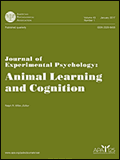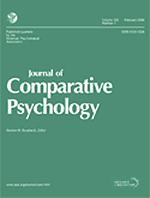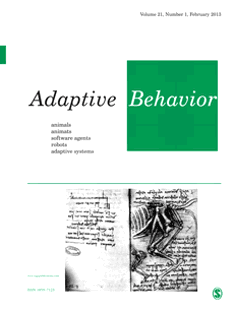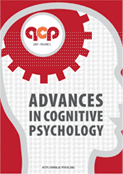
JOURNAL OF EXPERIMENTAL PSYCHOLOGY-ANIMAL LEARNING AND COGNITION
Scope & Guideline
Innovating Research in Animal Learning and Cognition
Introduction
Aims and Scopes
- Animal Learning Mechanisms:
The journal extensively covers the principles of learning as observed in various animal species, focusing on associative learning, operant conditioning, and classical conditioning. It seeks to elucidate how animals acquire, modify, and express learned behaviors. - Cognition in Non-Human Species:
A significant focus is on cognitive processes in animals, including categorization, memory, and decision-making. This area aims to bridge findings from animal studies to insights about human cognition. - Comparative Psychology:
The journal promotes comparative studies that analyze similarities and differences in learning and cognition across species, contributing to a deeper understanding of evolutionary aspects of behavior. - Methodological Innovations:
It encourages the development and application of innovative experimental methodologies to study learning and cognition, enhancing the rigor and reproducibility of research findings. - Interdisciplinary Approaches:
The journal supports research that integrates perspectives from behavioral psychology, neuroscience, and evolutionary biology, fostering a holistic understanding of learning and cognition.
Trending and Emerging
- Equivalence Class Training and Learning:
Recent studies have highlighted the impact of equivalence class training on learning processes in animals, suggesting a growing interest in understanding how animals categorize and relate information based on equivalence. - Complex Behavioral Phenomena:
There is an increasing focus on exploring complex behaviors such as decision-making under uncertainty, temporal order processing, and the interplay between habits and goal-directed actions, reflecting a shift towards more sophisticated models of learning. - Mindfulness and Learning:
Emerging research is investigating the role of mindfulness and attention in learning processes, indicating a trend towards understanding how cognitive states influence learning outcomes. - Interdisciplinary Research on Cognition:
The journal is increasingly publishing studies that integrate cognitive psychology with neuroscience and behavioral ecology, suggesting a trend towards interdisciplinary approaches that enhance the understanding of animal cognition. - Application of Advanced Technologies in Research:
There is a notable increase in the use of advanced technologies, such as transcranial direct current stimulation (tDCS), to explore learning and cognition, indicating a trend towards innovative techniques that can manipulate and measure cognitive processes.
Declining or Waning
- Focus on Simple Conditioning Paradigms:
Research centered solely on basic classical and operant conditioning paradigms has seen a decline, as studies increasingly incorporate more complex and ecologically valid scenarios that better reflect naturalistic learning environments. - Basic Neuroscientific Mechanisms:
While understanding neural mechanisms of learning remains important, there is a noticeable waning interest in purely neurobiological studies without behavioral context. Researchers are now more inclined to explore how neural processes relate to actual learning and decision-making behaviors. - Research on Non-Comparative Learning Models:
There is a shift away from studies that do not compare cognitive processes across species. The focus is increasingly on comparative approaches that provide broader insights into learning mechanisms.
Similar Journals

COGNITION & EMOTION
Exploring the Nexus of Thought and FeelingCOGNITION & EMOTION is a leading academic journal published by Routledge Journals, Taylor & Francis Ltd, focusing on the dynamic interactions between cognitive processes and emotional responses. Established in 1987, this esteemed journal has made significant contributions to the fields of Arts and Humanities, Developmental and Educational Psychology, and Experimental and Cognitive Psychology, consistently ranking in the top quartile (Q1) across various categories. Housed in the United Kingdom, COGNITION & EMOTION boasts a remarkable impact factor, underscoring its influence and importance in advancing psychological research and theory. While this journal does not offer open access, it remains a vital resource for scholars, professionals, and students seeking to deepen their understanding of emotional and cognitive phenomena. With a commitment to rigorous peer-reviewed research and innovative insights, COGNITION & EMOTION is essential for anyone aiming to stay at the forefront of psychological studies.

SOCIAL COGNITION
Advancing understanding of human thought and interaction.SOCIAL COGNITION, published by GUILFORD PUBLICATIONS INC, stands as a prominent journal in the fields of Developmental and Educational Psychology and Social Psychology, holding a commendable Q2 ranking in both categories as per the latest 2023 metrics. With an ISSN of 0278-016X, this journal has been a vital resource for researchers and practitioners since its inception in 1996, showcasing rigorous empirical studies and theoretical advancements that inform our understanding of social behavior and cognitive processes. While operating under traditional access options, the journal's diverse range of topics makes it essential reading for those exploring the intricacies of human thought and interaction, with its Scopus ranking reflecting its significance in contemporary psychological research. The editorial board seeks to further advance knowledge in this domain through innovative methodologies and interdisciplinary approaches, ensuring that SOCIAL COGNITION remains invaluable to its readership based in the United States and beyond.

PSYCHONOMIC BULLETIN & REVIEW
Exploring the Depths of Cognitive and Experimental Psychology.PSYCHONOMIC BULLETIN & REVIEW is a premier journal published by SPRINGER, dedicated to advancing the fields of psychology, particularly within the domains of Arts and Humanities, Developmental and Educational Psychology, and Experimental and Cognitive Psychology. With its ISSN 1069-9384 and E-ISSN 1531-5320, the journal serves as a vital resource for researchers, professionals, and students striving to stay at the forefront of psychological science. The journal boasts an impressive impact factor and ranks in the top quartile (Q1) in relevant categories, reflecting its prestigious standing in the academic community. Covering research from 1994 to 2024, it offers rich interdisciplinary insights into psychological processes and theoretical developments, supporting researchers in disseminating their findings effectively. While not an open-access journal, it provides various access options to ensure that vital research remains within reach of its audience. With a commitment to fostering scholarly dialogue and innovation, PSYCHONOMIC BULLETIN & REVIEW plays an indispensable role in shaping contemporary psychological discourse.

LEARNING & BEHAVIOR
Shaping the Future of Learning and Behavioral ScienceLEARNING & BEHAVIOR is a distinguished academic journal published by SPRINGER that serves as a critical platform for the dissemination of research in the fields of behavioral neuroscience and cognitive psychology. With an ISSN of 1543-4494 and an E-ISSN of 1543-4508, this journal publishes high-quality, peer-reviewed articles that explore the complexities of learning processes and their behavioral implications. Despite its current Q4 status in Behavioral Neuroscience and Q3 in both Cognitive Neuroscience and Experimental and Cognitive Psychology, LEARNING & BEHAVIOR remains a valuable resource for researchers seeking to enhance their understanding of these dynamic fields. The journal has a converged publication timeline from 2003 to 2024, ensuring that it captures emerging trends and innovative methodologies. With robust accessibility options for a diverse readership, the journal fosters a comprehensive academic environment, inviting submissions that contribute to theoretical advancements and practical applications in understanding behavior. Authors and readers are encouraged to leverage this journal to engage with cutting-edge research that drives the behavioral sciences forward.

ZHURNAL VYSSHEI NERVNOI DEYATELNOSTI IMENI I P PAVLOVA
Pioneering Discoveries in Medicine and NeuroscienceZHURNAL VYSSHEI NERVNOI DEYATELNOSTI IMENI I P PAVLOVA is a prominent academic journal dedicated to the fields of neuroscience and medicine, published by MEZHDUNARODNAYA KNIGA. Since its inception in 1951, this journal has served as a vital platform for disseminating innovative research and findings in the study of nervous activity and complex neural mechanisms. With its ISSN 0044-4677, it provides essential insights that cater to both seasoned researchers and emerging scholars alike. Although currently categorized within the Q4 tier in both the Medicine and Neuroscience fields, the journal actively contributes to advancing knowledge and understanding in these critical areas. The scope of the journal encompasses a broad range of topics pertinent to general neuroscience, making it an invaluable resource for professionals seeking to stay abreast of developments in this dynamic discipline. Researchers and students are encouraged to explore its extensive archives and engage with the diverse perspectives presented throughout its issues.

ANIMAL COGNITION
Bridging Disciplines: Discovering the Depths of Animal CognitionANIMAL COGNITION is a prestigious academic journal dedicated to the exploration of cognitive processes in non-human animals, bridging the fields of ecology, evolution, behavior, and cognitive psychology. Published by Springer Heidelberg in Germany, this journal has established itself as a leading platform for innovative research since its inception in 1998, showcasing important findings that enhance our understanding of animal minds. With an impressive impact factor reflected in its Q2 rankings within both the Ecology, Evolution, Behavior, and Systematics and Experimental and Cognitive Psychology categories, ANIMAL COGNITION serves as an invaluable resource for researchers, professionals, and students alike. Although it currently does not offer open access, the journal's rigorous peer-review process ensures the highest quality of published research, making it a vital component of scholarly discourse in the study of animal cognition. As the journal continues to evolve into 2024 and beyond, it remains committed to advancing our knowledge while inspiring future generations of researchers in this fascinating field.

JOURNAL OF COMPARATIVE PSYCHOLOGY
Illuminating the Path of Comparative StudiesJOURNAL OF COMPARATIVE PSYCHOLOGY is a prestigious academic journal published by the American Psychological Association, dedicated to advancing the understanding of behavioral processes across diverse species. With its ISSN 0735-7036 and E-ISSN 1939-2087, the journal has been a cornerstone of comparative psychology research since its inception in 1983. It primarily caters to the fields of ecology, evolution, and behavior, ranking impressively in the Q2 quartile in the category of Ecology, Evolution, Behavior and Systematics, and Q3 in the miscellaneous Psychology category as of 2023. This journal serves as a vital platform for disseminating high-quality research, addressing both fundamental questions and applied issues in systematic studies of behavior across species. Although not open access, its rich repository of research articles, meta-analyses, and reviews makes it an indispensable resource for researchers, practitioners, and students striving to deepen their knowledge and foster innovation in comparative psychological studies. With a commitment to rigorous peer review and scholarly excellence, the JOURNAL OF COMPARATIVE PSYCHOLOGY is a key player in shaping the discourse within its field and driving future research.

ADAPTIVE BEHAVIOR
Innovating Understanding of Human and Artificial AdaptationADAPTIVE BEHAVIOR is a renowned academic journal published by SAGE PUBLICATIONS LTD, dedicated to advancing the understanding of adaptive mechanisms in behavior across a spectrum of disciplines. With a focus on Artificial Intelligence, Behavioral Neuroscience, and Experimental and Cognitive Psychology, this journal aims to facilitate the dissemination of innovative research and theoretical advancements that relate to adaptive behaviors in both humans and artificial systems. The journal, which spans from 1992 to 2024, holds a commendable position within its field, ranked in the Q3 category for multiple categories, and Q1 in Philosophy. Furthermore, it is recognized within Scopus rankings, ensuring its impact and relevance in the academic community, with a notable rank of #57 in Experimental Psychology and #49 in Behavioral Neuroscience. While ADAPTIVE BEHAVIOR does not currently offer Open Access options, it maintains a vital role in bridging disciplines and fostering discourse among researchers, professionals, and students who are exploring the complexities of behavior in adaptive systems.

Journal of Cognitive Science
Innovating Insights in Cognitive ScienceThe Journal of Cognitive Science, with ISSN 1598-2327, is a distinguished publication from SEOUL NATL UNIV, INST COGNITIVE SCIENCE, focusing on the multidisciplinary field of cognitive science. Established in 2016, this journal aims to advance knowledge in various domains, including Artificial Intelligence, Cognitive Neuroscience, and Experimental Psychology, while also delving into Linguistics and Language. Although currently categorized in Q4 for several subjects in the 2023 rankings, it presents an invaluable platform for innovative research and scholarly discourse, providing insights that connect cognitive processes with practical applications, thus fostering cross-disciplinary collaboration. Located in South Korea, the journal adheres to rigorous academic standards, inviting submissions that contribute significantly to understanding cognition in a digital age. While it does not offer Open Access, readers can access articles through university libraries and academic databases, engaging with the latest findings and theories that shape the future of cognitive science.

Advances in Cognitive Psychology
Illuminating the Pathways of the MindAdvances in Cognitive Psychology is a premier peer-reviewed journal published by UNIV ECONOMICS & HUMAN SCIENCES WARSAW, dedicated to the exploration of psychological processes underlying cognition. With its open access model implemented since 2005, the journal facilitates wide-ranging dissemination of cutting-edge research across various branches of psychology, including applied, clinical, experimental, and cognitive psychology. Despite its modest standing in terms of impact factor, reflected in its Q3 and Q4 rankings across numerous subfields, it remains an important platform for emerging researchers and seasoned professionals alike, aiming to foster insight into complex mental processes and enhance understanding of behavioral patterns. The journal's commitment to accessibility empowers a diverse community of readers, including students, to engage with innovative studies and reviews, contributing to the collective knowledge within the psychological sciences. Located in Poland, Advances in Cognitive Psychology is open for submissions from worldwide researchers, encouraging a global perspective on cognition and behavior.